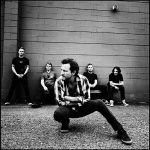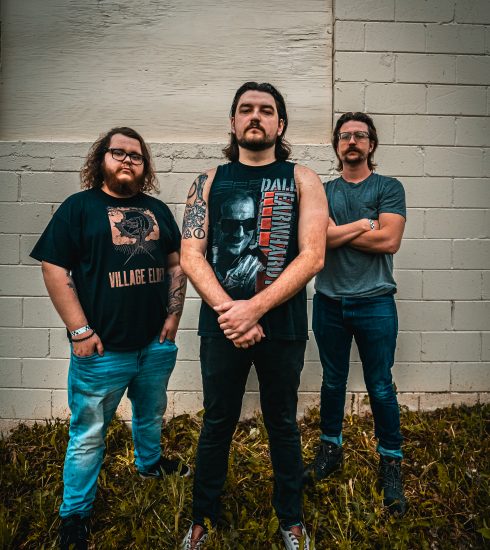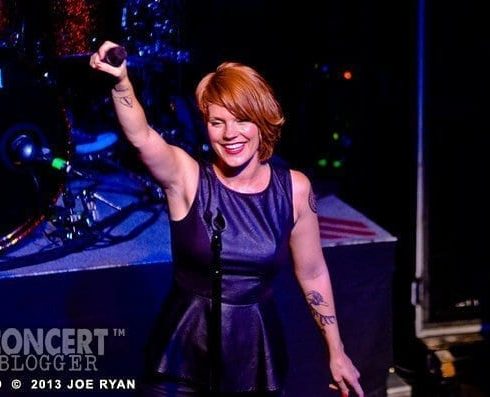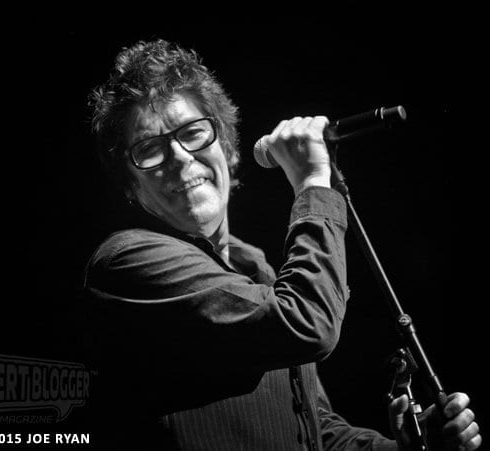The long-awaited new studio album from blues guitarist Jonny Lang will be released on September 17th in the U.S. He was gracious enough to sit down with David Medeiros to talk about his start as a professional musician at 13, his early success, why it took so long for this album to be released, and even his secret diversion. It’s been seven years since the last studio album from Jonny, but the release of “Fight For My Soul” will remind those that may have forgotten, just how powerful Jonny’s music is.
David Medeiros- You first burst onto the music scene as a 16 year-old with the release of your multi-platinum hit “Lie To Me”, and you were recording for several years prior to that, do you find that people still think of you as that “Young Kid” even though you have been a professional musician for longer than you weren’t, and do you think that helps or hurts you?
Jonny Lang- Your first impression of somebody tends to stick aroundand every time you see them you try to fit them into the idea of who they were when you first saw them. I think it’s the nature of us, and it probably helps if anything just because maybe there is a nostalgic link there.
DM – When you were 12 your father took you to see The Bad Medicine Blues Band, had you previously been playing guitar or was that your first exposure?
J.L.- No, No, when I saw that guitar player (Ted Larson) it just completely blew my mind and I decided right there that I had to learn how to play this thing. I had to sound like that guy. I had never heard anything like that before. So that was the first time I’d ever wanted to do that.
DM- Your introduction to the guitar was at twelve years old, and you were recording professionally at fourteen? That’s amazing!
J.L- Yes
DM- You’ve been a regular part of the Experience Hendrix tour, I would assume he is a major influence. What other artists are you a fan of? Not necessarily that you have incorporated into your sound, but artists that you are really a fan of.
J.L.-I always say this, but I think the two artist who have inspired me the most over the years are Stevie Wonder and James Taylor.
DM – Wow! Really? I would never have guessed, but yes, I can see that influence, especially on the new album. Since your last studio album you have chosen to forgo the big label contract to become an independent artist. What lead to that decision and what’s it like to finally be in complete control of every aspect of your music?
J.L.- Well, (Chuckles) you think you’re in control, then you realize your not! It’s just on paper that you’re really in control. Being on a record label was cool. I had good relationships with everyone over there. It was just that with the implosion of the record industry it didn’t seem that they were doing a lot of marketing. That is the thing that, in my mind, a record label does. They kind of had bigger fish to fry, and I understand that. I just asked if I could get off the label and they let me do it. It’s nice to make music and there’s nobody there to say anything one way or another about it creatively. The downside is that all of a sudden all those logistical things that they have these great big teams to handle, aren’t being taken care-of. I have a wonderful team of folks, manager, booking agent, attorney, business manager, and all that. They really help out with that stuff, but I’ve really learned a lot in making this record.
DM- It’s been seven years since your last studio album and this album was recorded over a three-year period. How did you decide that this was the right time to release it?
J.L.- You know I don’t really know how to answer that. It was, all right, the album is nearing completion, maybe, we can find a few labels to partner with to distribute it. Once that happened the labels have their input as to when they’d like to release it and then it all starts coming together. It’s literally a day-by-day process the entire time. There is very little that’s planned out way ahead of schedule. It’s all just kind of happening as it goes.
DM – You have four children under 5 years old. I’m sure that played a part in the extended process of recording “Fight For My Soul”, to be a part of their lives? Is that true?
J.L.- Absolutely, That was the reason for the delay between the last album and this one. I f I would have tried to get a record out at that time then I wouldn’t have been able to spend any time with my kids. It just took a while to do, and trying to balance that and being with the family was pretty challenging, but we finally got a record out (Chuckles) so it’s all worked out.
DM – You have been quoted as saying that this album doesn’t have a goal or theme. I’ve found that in listening to it that a lot of the songs are about love, redemption, and settling down. Is this just a byproduct of what you were going through when writing and working on the songs?
J.L.- Yea, absolutely, certainly they are all little pictures of various states I’ve been in over the years. Weather they are specifically about it or just about the emotion of it as it reflects what I was going through, I don’t know. There is no theme really, none that I ever really tried to steer towards a direction to anyway on it. Both musically and lyrically every song kind of has it’s own thing.
DM – My personal favorite track is “What You’re Looking For” Can you tell me a little about it and what your mindset was when you were in the studio recording it?
J.L.- Yea, that song, as with a lot of the songs that song started out as me playing acoustic guitar. When I played it for the musicians in the studio, it was just on acoustic guitar and singing. I said here it is guys, go ahead and do what you’d like. Interpret the way you want and see how it goes. 99% of the time, the way they played it was better than I had imagined I wanted. Everything about making music that way is just wonderful to me. Not controlling anybody, but just trusting them to do the right thing and having that happen, having it pan-out, is just awesome. It was just a great experience.
DM – “Fight For My Soul” doesn’t feel like a typical blues guitar record at all. The typical formula is the guitarist out front and the band playing a back-up role. On this record each musician is just as important as the others. It’s more of a band than a guitarist and his back-ups. Does that come from the long time spent touring with these guys before putting out an album? That musical camaraderie that you build on the road translated into the studio.
J.L.- Yea, it’s to the point with those guys now where we pretty much know what the other guy is going to do. Definitely it flows more than anything. Instead of saying maybe we should try this or how about that, you don’t really have to say any of that. It really just happens. There is something to be said about knowing each other musically from being on the road. It great because now I can play the songs, live, with the guys who are on the record. It’ll represent the record well in that respect.
DM – Another song that stands out is “Seasons”, it’s a bit of a holiday song. Was there any hesitation to include it on this album?
J.L.- (Chuckles) Oh Yea! I didn’t want that one on the record at all actually. I had always thought of that as sort of a song that I had written as just kind of therapy for myself. It had just come out and I never thought it would be on a record. (Producer) Tommy (Sims) and our engineer Danny had talked me into it, or basically made me do it. It’s supposed to sound like a nice holiday song but then all of a sudden it’s really kind of like an anti-holiday song. A few people asked me why I was putting it on an album that we’re releasing in September.
DM – On a few of the songs there are some really bigger arrangements, strings and more instruments. Is that something that you consciously thought, “I want to make it sound bigger”? A lot of guys go for the stripped down set-up for blues guitar albums. Was it a conscious idea to do that?
J.L.- It’s been something that I’ve wanted to do for years and years. It’s kind of been in parts, in my head, and I’ve wanted to do it. I was just kind of afraid. I was thinking “This is too outside of the box for people and what they might be expecting of me.” The great thing about doing this record is that I didn’t approach anything with that sort of fear. Hopefully some people like it, but I tried to make it more intricate as far as the arrangements.
DM – You are headed to Europe in October where most of the shows are already sold out. This will be your first time in Paris in, I believe, ten years. How would you compare the fans there and the fans here in the U.S?
J.L.- Man, The folks over there are extremely, and when I say over there I mean Europe in general, They just don’t really care about being entertained as much as folks in the U.S. I feel like. They would be just as excited to see somebody sitting on a stage with no set construction, sitting on a chair playing acoustic guitar and singing for two hours and they would be hanging on every word. They really approach it more like an art rather than something to be entertained by. It’s a different experience but it’s always a thrill to play for folks in that mind frame.
DM – Can you tell us something about yourself that maybe most of your fans are not aware that they would be surprised to know?
J.L.- I usually say the James Taylor thing. Probably my biggest addiction and obsession outside of playing music is golf. I love playing golf! I’m a junkie.
DM – Are you a duffer, or do you keep a handicap?
J.L.- I keep a handicap now and I’ve gotten a lot better over the years. It’s to the point where it’s really fun to play. Before I was miserable by the time I completed a round of golf, but now it’s pretty fun. I play a lot of charity tournaments, but I’ve never gotten a chance to play with a real professional golfer. I’d really love to do that.
DM – Thanks for taking the time out of your busy schedule to talk to us.
J.L.- Thank You
For more information on Jonny Lang, please visit:
Official website: www.jonnylang.com
Facebook: https://www.facebook.com/JonnyLang





